There are three reasons we see aviation salespeople struggle to meet their goals.
This really stinks because they can be working like crazy, and doing everything else perfectly. They can spend a ton of money on advertising, have a fantastic marketing system, and say all the right words in a sales presentation and still lose the sale!
It’s SO frustrating!
And I’ve been there myself, so I totally get how it can happen, even when we know better!
The good news is, it’s totally fixable.
[embedyt] https://www.youtube.com/watch?v=We0rTRprASk[/embedyt]
[fusebox_track_player url=”https://traffic.libsyn.com/secure/aviationmarketing/Why_Aviation_Salespeople_Fail.mp3″ background=”default” ]
These two pages from our Aviation Sales Professional Course summarize most what what’s included in this episode.
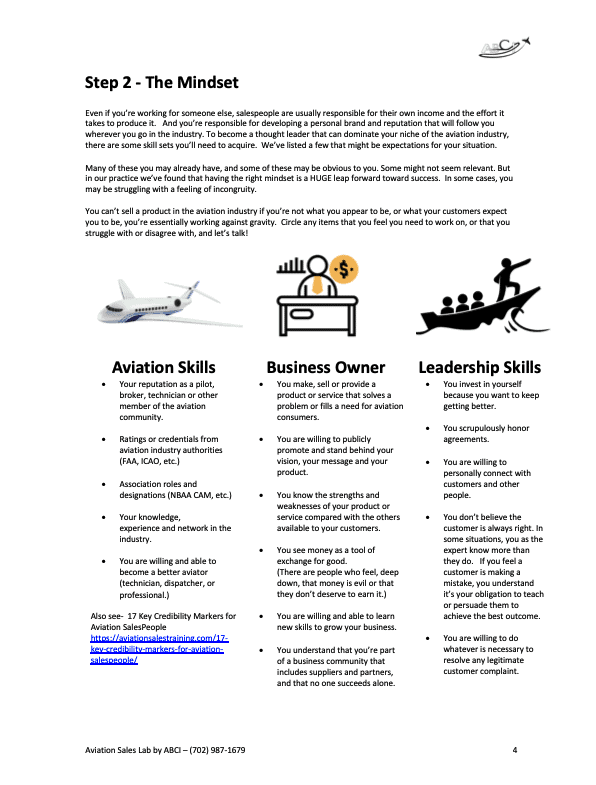
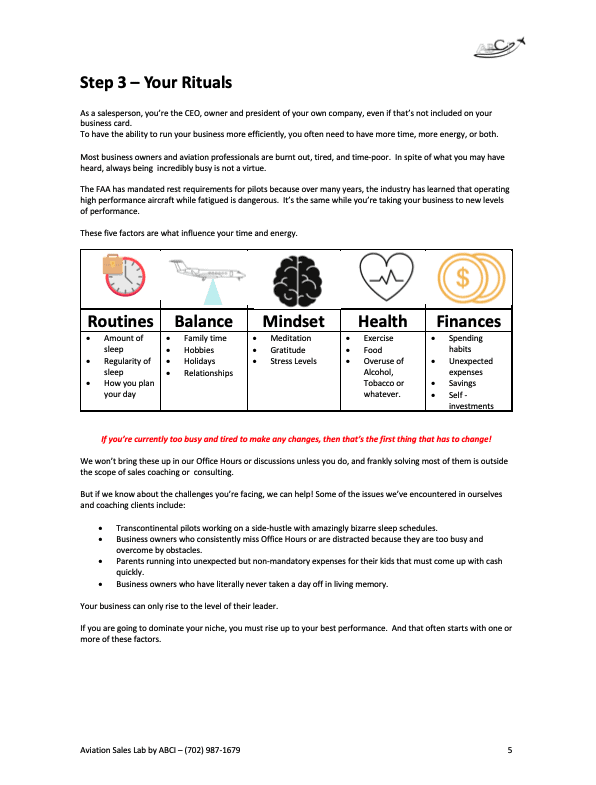
Transcript – Why Aviation Salespeople Fail and What to Do About It!
Paula Williams:
Welcome to this week’s episode. Today, we are going to talk about why aviation salespeople fail and how to not.
John Williams:
Fail.
Paula Williams:
Fail.
John Williams:
You mean they do all the wrong stuff and now they’re just learning what not to do.
Paula Williams:
Exactly. They do the wrong thing, and failure is just the opportunity to figure out how to do the right thing.
John Williams:
Exactly.
Paula Williams:
Okay. If you’re failing, you’re learning. That’s what my yoga teacher always used to say. If you’re falling, you’re learning.
John Williams:
My ski instructor used to tell me if you’re not falling down you’re not learning.
Paula Williams:
Absolutely. But there are some very specific things. And mostly what we’re talking about today is mindset. And I know a lot of people think, well, that’s so elementary. I know all that stuff. But when you go into an MBA program, when you go into a doctoral program, when you go into some of the advanced training that you’ve had, a lot of times, the first thing they do is spend hours on mindset because it is so important, right?
John Williams:
Yeah. I’ve taken a course on some business interests I had.
Paula Williams:
Corporate investing, right?
John Williams:
Well-
Paula Williams:
I mean, that’s pretty advanced stuff.
John Williams:
Yeah, they have the second… Let’s see, the second class is an hour on mindset.
Paula Williams:
Right. So this is not something to sneeze at and this is not something to say, “You know what, I’m good on that. I just want all of the tips and tricks and all of the technical things that you can give me.” The thing is I can tell you all the words to say in a sales call and it still isn’t going to work if your mindset isn’t right.
John Williams:
That’s true.
Paula Williams:
And we can set up the best marketing system on the planet that will target the right people and do everything exactly right, and you’re still going to lose every sale if you turn people off because of your mindset. And that’s the easiest thing to do. And it is the hardest thing to get right. I struggle with this usually on Mondays. That’s why I never make sales calls on Mondays.
But it is something that we all struggle with and it’s something that we all have to think about. So these are the most common reasons that people fail with aviation sales.
Number one, they are too busy or too rushed to do it right. So they skip steps. They are lazy. They cut corners. They do things like that. A lot of times people know what they should be doing. They just think, Oh, well, nobody will notice if I don’t make a hundred calls this week, or whatever it is that they decided they needed to do.
John Williams:
Well when they get too rushed, if they do make a call and if they do talk to somebody, they don’t listen.
Paula Williams:
Yes. Exactly. It all comes out in a jumble. And people don’t feel like they’re understood or listened to or anything like that. And that is just going to suck the air right out of your process.
Number two is that you are low energy or too tired. If you aren’t excited about what you’re doing, people can tell. If you’re just phoning it in, people can tell. So that’s something that you need to avoid. And we’re going to talk about how to avoid all these four things anyway.
Number three is you hate sales. People can tell if you are uncomfortable about what you’re doing. Maybe you’re fine until you get to the part where you start negotiating money and then you start backpedaling or soft punching or pulling your punches or things like that because you hate that part. I totally understand but it needs to be done.
The fourth thing is that you feel icky about sales.
John Williams:
What does icky mean?
Paula Williams:
Icky means, let’s say that you just had a dinner party and ended up sitting next to your nephew who is a very earnest socialist. So some of that may have rubbed off on you and then you feel icky on Monday morning, because sales is bad and capitalism is bad. Some of that kind of rubs off. There’s a lot of that in the culture right now that makes you feel funny about making sales in aviation and making these multimillion dollar deals in a lot of cases. So you have to feel good about what you’re doing. You have to understand the world and your place in it in a way that you feel really good about and don’t feel icky.
John Williams:
Interesting word, icky.
Paula Williams:
Okay.
John Williams:
Okay. Fine.
Paula Williams:
Okay. All right. So the way that you work on your mindset and avoid all four of those things, because you can’t just decide, you know what, I’m not going to feel icky and move forward. This takes some actual work.
So three of the things that we talk about in our lab and in our courses are three types of skills basically. Aviation skills. Obviously, knowing what you’re doing. Knowing the product. Knowing those kinds of things. In a lot of cases your reputation as a broker or as a pilot or as an A&P or as whatever it is that your credentials are in the aviation industry are pretty key. So if you feel like you would have more credibility if you had your instrument rating, that’s what I’m working on right now, you need to be working on that. And you need to be doing that. John has more than enough credibility for both of us in terms of aviation skills, right?
John Williams:
Well, I don’t know about that, but we try.
Paula Williams:
Right, exactly. Association roles and designations. So if you are a CAM with NBAA, we throw a few more acronyms at you, or if you are a president of an association or a treasurer for an association. Things like that are ways of really boosting your aviation credibility.
Your knowledge and experience and your network in the industry. If you know a lot of people by name and they can vouch for you, those are things in the aviation industry that can help you.
If you are willing and able to become a better aviator all the time, people know that and they can feel that. If you are constantly improving your own skills rather than just phoning it in. And we do have 17 credibility markers for aviation salespeople on our website. I’m going to link to that so you can some of those ways that you can boost your credibility in the aviation industry.
Second category that really gives you the confidence and the energy and everything else that you need is if you are a fantastic business owner. So that you can prioritize things correctly, you make sell, or provide a product that solves a problem or fills a need, and you truly believe that and you don’t just believe that it is another also-ran in the industry or, heaven forbid, that you believe that maybe your competitor’s product is better, which does sometimes happen. But if that’s the case, you need to do something about that.
John Williams:
Exactly.
Paula Williams:
Okay. You’re willing to publicly promote and stand behind your vision and your message. So your business is in line with what you believe and your socialist cousin isn’t going to shake that belief. If they’re able to do that then you probably need to work on your mission a little bit more so that it’s not just something that’s hanging on the wall, it’s something that actually means something to you. You know the strengths and weaknesses of your product or service compared with others on the market. So you’re not going to be surprised by a competitor and you’re not afraid of your competitors. You know when they’re better and you’re willing to recommend them in situations where they are better.
John Williams:
We have done that.
Paula Williams:
Yes. You see money as a tool of exchange for good. This is the heart and soul of capitalism, which is the reason that we have Microsoft and Google and all of those things in the United States. And that’s what makes the world go round, right?
John Williams:
Mm-hmm (affirmative).
Paula Williams:
It’s not perfect, but it is better than anything else that has ever been tried.
John Williams:
As far as we can tell.
Paula Williams:
Exactly. You are willing and able to learn new skills to grow your business. So in some cases, that’s going to be things like you’re able to install software to make things easier on yourself and to save time and energy and money. We just spent a ton of money on a new computer for yours truly because we needed to make that investment. It’s time.
John Williams:
And just not to put too fine a point on it but the new computer will probably save her, on the days she does video, probably save her four hours a day.
Paula Williams:
Right. We’re doing a whole lot more video than we ever did before so we’re recognizing in our Monday meetings that our business has changed from where it was when we purchased equipment last time.
John Williams:
Mm-hmm (affirmative).
Paula Williams:
And we need to make some adaptations to accommodate that. All of our clients want video. So we’re needing to accommodate that.
Last part of this section is you understand that you’re part of a business community that includes suppliers and partners and no one succeeds alone. I mean there’s a lot of people that, I think in the U.S. school system in particular, people learn to keep their heads down, keep their eyes on their own paper, do your own work, do everything yourself. And they’re afraid of group projects. They’re afraid of working with other people. They’re afraid of if I ever work with somebody else, they could torpedo us.
John Williams:
Well, they have been to the point where they have expected other people to do their part and they fail. So they don’t trust people in a group situation.
Paula Williams:
Exactly. And it’s really hard to find people that you can trust. It is so much easier sometimes to do everything yourself, but that’s not a sustainable longterm strategy for a company of any size.
John Williams:
You can’t scale that way.
Paula Williams:
Right. There’s a point, and we’re there, where we have to scale more and we have to find more people and so on. That was a our big goal for the year is to grow our team. And we’re doing that. And it’s great so far. It’s not without bumps.
John Williams:
Issues. That’s right.
Paula Williams:
But we always rely on ourselves, John and myself, and that’s what it always comes down to, which is great. But we do have to have other people doing other things and we have to trust them and we have to make it work. Right?
John Williams:
Yes.
Paula Williams:
Okay. All right. So that is business owner skills.
The third part of this leadership skills. So you invest in yourself because you always want to keep getting better. We invest a ton of money in training courses. I have a PMP, and that requires me to do 60 hours of in-service training every three years. And you have a similar thing with your MBA, don’t you?
John Williams:
No.
Paula Williams:
No? You don’t have to do anything to keep that. Well, obviously to keep an MBA you have it forever.
John Williams:
Yup.
Paula Williams:
But you are a firm believer in continuing to-
John Williams:
Yeah, I’m always taking classes on one thing or another.
Paula Williams:
Yeah.
John Williams:
At the end of this course I’m taking… Well, before this course I took a course on quantum mechanics.
Paula Williams:
Mm-hmm (affirmative).
John Williams:
It was 24 45-minute lessons. Amazing stuff. If you had an interest, you could look it up.
Paula Williams:
That was in The Great Courses, right?
John Williams:
Yeah.
Paula Williams:
Okay. Yeah, those are great. We really like Udemy. There’s a lot of people that do really good courses. We like GKIC, especially the old, classic GKIC. We really like AWAI, they put out some really great courses on copywriting and design and other other subjects as well.
John Williams:
I got invited to get involved and take classes with the individual learning how to do LBOs.
Paula Williams:
Mm-hmm (affirmative).
John Williams:
It’s quite interesting.
Paula Williams:
Oh yeah. And everything you learn, you can apply in some way in your business even if it’s not obvious how that works. But if you’re always learning that’s really where that comes from.
You scrupulously honor agreements, even if you don’t want to or even if things change or whatever the situation is. There have been times when we’ve pulled all nighters to honor agreements where we probably cared more than the customer did, but those are things that we got to do.
John Williams:
Yup. It’s what we do.
Paula Williams:
You are willing to personally connect with customers and other people. Now we have in the past worked with aviation companies where the owner wants to be sort of anonymous and they want to kind of hide behind their website and other things. And they don’t really want to have a contact number on there. They want things to be pretty automated and things like that. Those things never work out as well as they could. We love working with companies where the owner or CEO or somebody is willing and able to be the rockstar of the company and really go public and express their belief in that product or service.
John Williams:
Yup. Absolutely.
Paula Williams:
Okay. And a lot of people are shy. They don’t want to be on video or whatever, but if you can get over that and believe in the product more than you disbelieve in yourself or more than you feel awkward. And that’s a conversation we’ve had with every one of our clients that has done video.
John Williams:
You get on video the first time and you don’t like it. And the second time it’s not too bad. And by the time you’ve done it 15 or 20 times, it’s ho-hum.
Paula Williams:
Yeah. It’s more important to get the information out in the most effective way than it is to worry about the, I sound funny or I feel funny.
John Williams:
Or I look funny.
Paula Williams:
Nobody cares that you look funny. It’s just one of those things.
John Williams:
Mm-hmm (affirmative).
Paula Williams:
Okay. And you are willing to do whatever is necessary to resolve any legitimate customer complaint.
John Williams:
Yep.
Paula Williams:
Right? Which does not mean that you pander to the weirdos. That means that you are willing and able to solve legitimate-
John Williams:
The customer is not always right, but they are always the customer.
Paula Williams:
Right. That is true. And you may have a customer that you just can’t please. If that’s the case, you need to find some equitable way to part ways with them.
John Williams:
We’ve done that.
Paula Williams:
We are a lot more careful going into relationships with folks. If it doesn’t work within 30 days, here’s what’s going to happen. That way there’s a lot less damage on both sides. Everybody walks away friends, and it all works out much better.
John Williams:
Yes, it does.
Paula Williams:
All right. So this is how you make all this happen. You can’t be working on your aviation skills and your business skills and your leadership skills if you’re exhausted and you’re always heads down, cranking out work.
John Williams:
That’s why you need people.
Paula Williams:
That’s why you need people and that’s why you need habits and routines. What you do every single day and every single week and every single month is either going to work for you or against you. And if you’re just grinding your nose against the wheel every single minute of every single day, that’s just not sustainable. So you really have to put things together in a way that you can carry on and enjoy it and enjoy your people and enjoy the benefits of company ownership. We get to go hiking sometimes during the week, if we can manage the schedule in that kind of a way. And we always feel like we’re playing hooky, but that’s the joy of it for us is that we really like our customers. I really like my job.
John Williams:
That’s a good quote, by the way. Who said that?
Paula Williams:
I did.
John Williams:
That’s a Paula quote.
Paula Williams:
It may have been someone else that said it first, but if you’re too busy to make any changes that’s the first thing that needs to change.
John Williams:
That’s absolutely correct.
Paula Williams:
Right. We have worked with so many people who are too busy to do their office hours. They’re too busy for many different things, and that’s just not a sustainable way to do business and we can’t help you if you can’t change anything.
John Williams:
That’s right.
Paula Williams:
So routines. And this should go without saying but it doesn’t go without saying. You should be getting enough sleep. It is so unusual to work with somebody who is not tired. But you know, that is a thing. We all have different routines. I’m kind of a night owl. John’s more of a morning person because he was in the military. So we struggle with our routine but we do try to get enough sleep.
The regularity of your sleep. So it doesn’t matter if we get… What is your saying? I don’t care which eight hours we get as long as we get eight hours.
John Williams:
That’s right.
Paula Williams:
Which is cool. How you plan your day. So I like to plan my following day before I finish work that night. I like to confirm all of our appointments, write them in and make sure that the next day is all set up with tasks and appointments and whatever’s going on. And then I go to bed. My subconscious works on stuff. Things all work out much better than if I am surprised all the time. Oh my goodness, we have appointment first thing in the morning with somebody.
Okay. Next thing is balance. We’ve got the weight and balance in an airplane image up there but it’s also a weight and balance in your life. Do you have enough family time? Do you have enough time for your hobbies? I like to play in the dirt and grow tomatoes and squash and stuff. And we like to go hiking and we’ve got things we like to do.
John Williams:
Yup.
Paula Williams:
Holidays and relationships and everything else. We have a date night every Friday. We try to do that and often more than that the whole weekend is kind of a date weekend. We try not to work on Fridays and Saturdays or Friday nights and Saturdays anyway. We sometimes work on Sundays because we love it. Right.
John Williams:
But we can typically take off almost anytime we want to.
Paula Williams:
Right. Exactly.
John Williams:
Like sometimes your car makes you take the day off to get it fixed.
Paula Williams:
Right. That happens. You have to be able to handle those kinds of emergencies and other things as they come up and have someone who can cover for you or have a plan B in order to make that work.
So mindset. A lot of people really benefit from meditation, benefit from practicing gratitude. I like to write in my journal three things I’m grateful for every day. Just at the end of the day, three things that happened today that I’m grateful for. And it really forces your brain to start thinking in terms of looking for good things that are going on instead of focusing on, Oh, I got to do this and Oh, I got to do that. And this needs to be fixed and that needs to be fixed.
John Williams:
Mm-hmm (affirmative).
Paula Williams:
It breaks the pattern. Managing your stress levels. That’s another one which we’re doing by getting another computer. Figuring out what’s driving you crazy and fixing it.
John Williams:
Mm-hmm (affirmative).
Paula Williams:
Okay. Your health. We both exercise at least four times a week, five times a week, depending on the week. And that’s part of the reason we don’t usually take early morning meetings except with long established clients and people on the other side of the United States.
Food. We did a Whole 30 thing about a year ago. Cut out all sugar for 30 days. It was horrible.
John Williams:
And caffeine and dairy and…
Paula Williams:
And everything else. It was a horrible 30 days but I’m glad we did it and now we’re actually about 80 percent, I would say, watching our diet and the rest of the time we splurge. We don’t turn down birthday cake or anything like that.
John Williams:
We just don’t do it every day.
Paula Williams:
Alcohol, tobacco, whatever. We’ve had clients that have struggled with different things and they have health problems and they have other problems. If you’re struggling with something like that, it really takes a lot of energy. And if you solve that first, you’re going to find everything else so much easier to do.
Finances. If you struggle with finances, and we all struggle with finances at one level or another and we’ve all been there. You know, where something happens and you got to manage the cashflow. But if you are doing that all the time, that’s going to add to your stress level. You got to have the resources to invest in your business and to be comfortable and to get the tools that you need.
John Williams:
Which is what we’re doing.
Paula Williams:
Exactly. So your savings and your plan for self-investment. You need to be able to buy courses and buy software and manage those kinds of things and be able to invest in yourself. So if you can save some money by cutting down on your Netflix subscription or cutting down on some other things. You know, one less night out a week or something like that it might help not only your routines and your sleep, but also your finances and everything else.
So all of that is difficult to do even for grownups, right?
John Williams:
Well if you spend $5.48 every day at Starbucks, you could go to McDonald’s and do the same thing for $2 a day.
Paula Williams:
You could. And over the course of the year, that adds up to enough to take a course or something.
John Williams:
That’s right.
Paula Williams:
Exactly. Or buy some of this software. There’s a lot of free and cheap software that’s going to make your life a whole lot easier nowadays, if you take the time and the investment to make that work.
John Williams:
Yes, it will.
Paula Williams:
All right.
John Williams:
Absolutely.
Paula Williams:
Okay. So that is mindset. What that is really going to help you do is… These are the symptoms really, and the outcomes that tell you that you’re in trouble. If you are too busy or too rushed to take a course or too busy or too rushed to implement a marketing solution or something like that, that’s a warning sign that something needs to change and those are the things that you can change.
You have low energy or you’re too tired. By 4:00 every day , heading back down to Starbucks for another latte, those kinds of things. If you hate sales. If you feel icky about sales. If any of those things happen, you really do need to go back to the basics and work on your mindset. And we do that with our clients all the time. You know, it happens. Somebody could be in business for 10 years, and then all of a sudden they wake up one morning and they hate sales. And it’s like, okay, well, let’s talk through this because that’s some going wrong and it might be something that’s super easy to fix. So it happens.
All right. Go Sell More Stuff!
John Williams:
The Industry Needs the Business!
Paula Williams:
Yup. That’s a paraphrase from our favorite, Zig Ziglar.
John Williams:
You betcha.
Paula Williams:
All right. Have a great week.
John Williams:
We’ll see you next time.

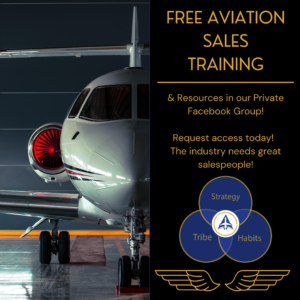
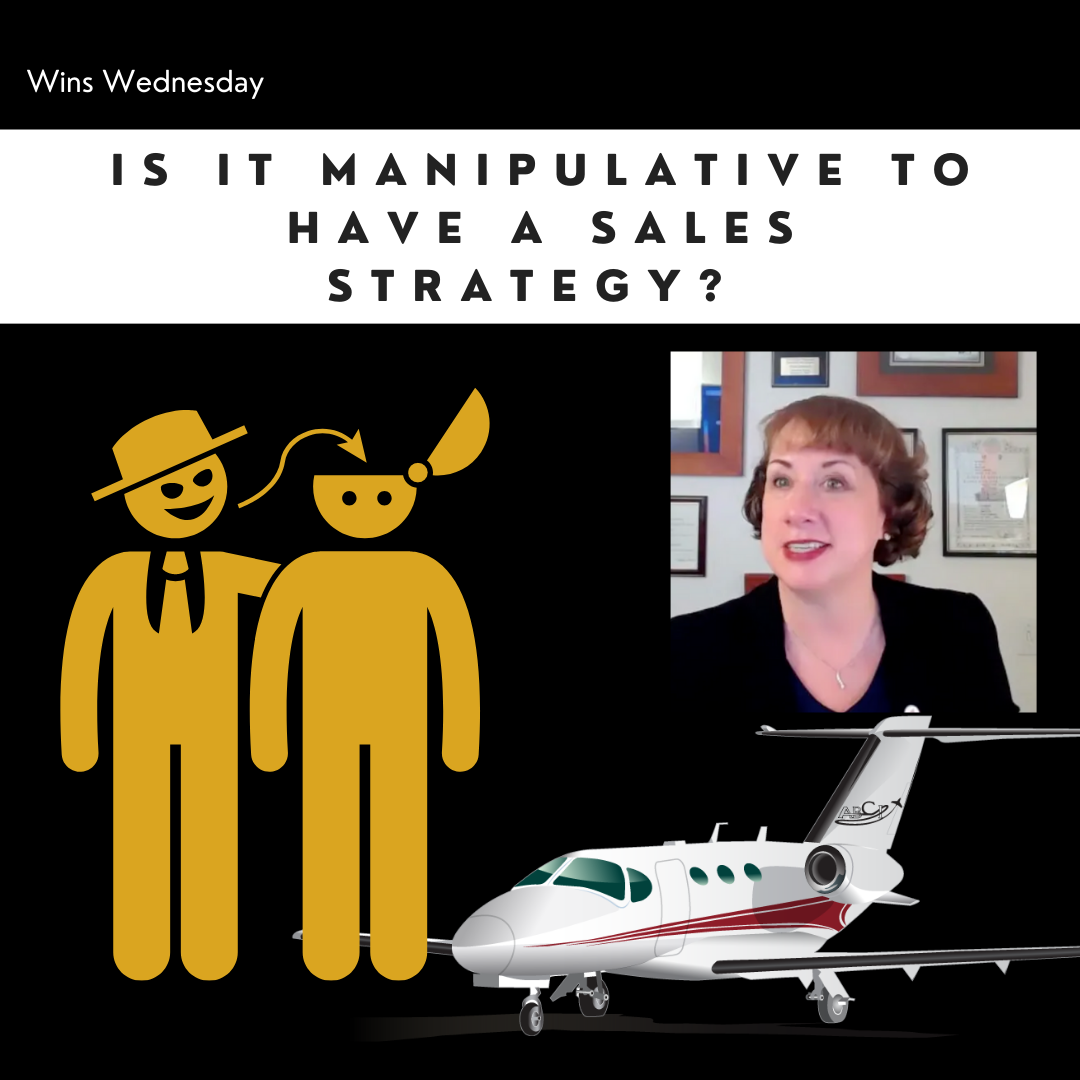
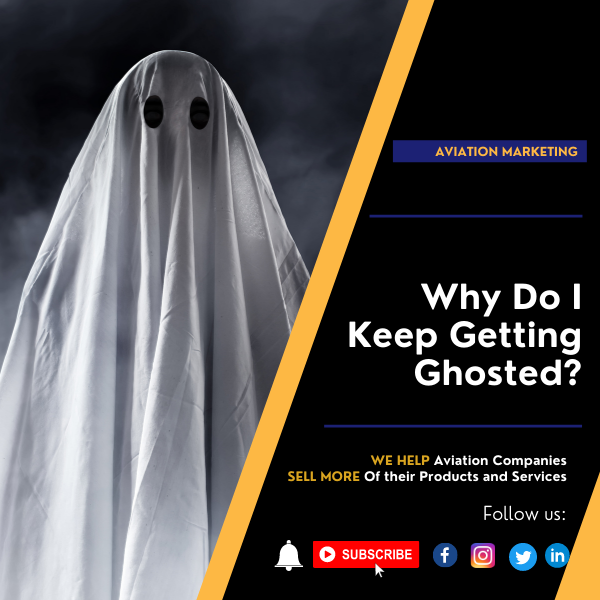
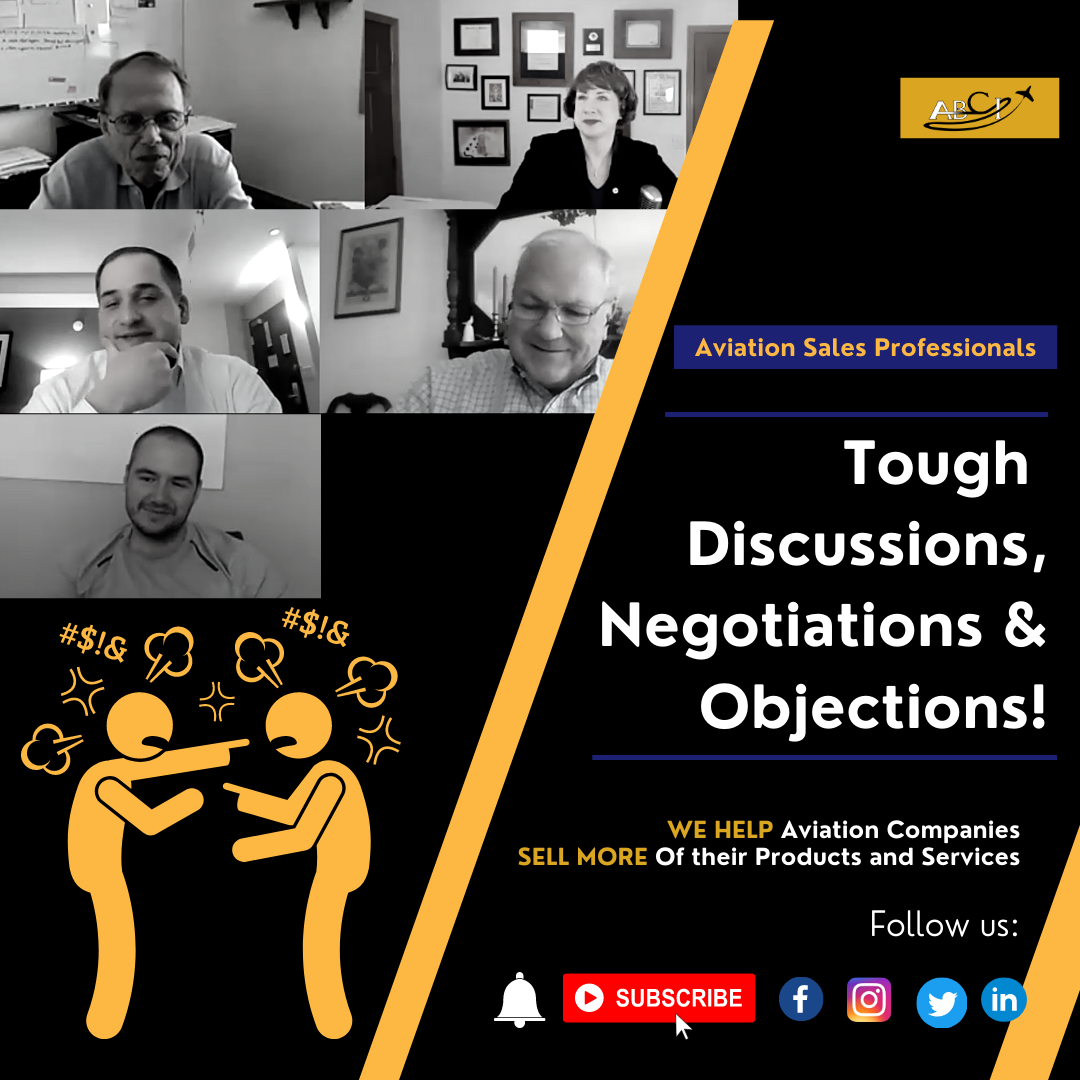
Very much informative and well described post it was. Thanks for sharing this amazing content with us.